Brazil braces for turmoil ahead of presidential runoff election
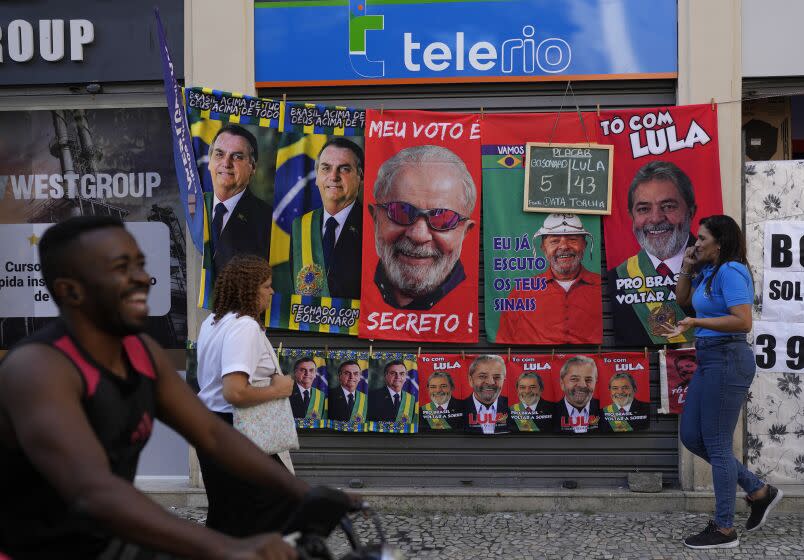
- Oops!Something went wrong.Please try again later.
- Oops!Something went wrong.Please try again later.
Last month, a man with a knife walked into a bar in northeast Brazil and asked whether anybody planned to vote for Luiz Inácio Lula da Silva in the country's upcoming presidential election.
"I will," a patron responded.
The man with the knife stabbed him to death.
In the run-up to Sunday's bitterly fought vote, in which Lula, a leftist who served as president from 2003 through 2010, faces right-wing incumbent Jair Bolsonaro, acts of politically motivated violence have become routine, with nearly every day bringing news of another election-related attack.
For many Brazilians, it's evidence of how this year's campaign has divided the nation in profound new ways — and an ominous sign of what could come next.
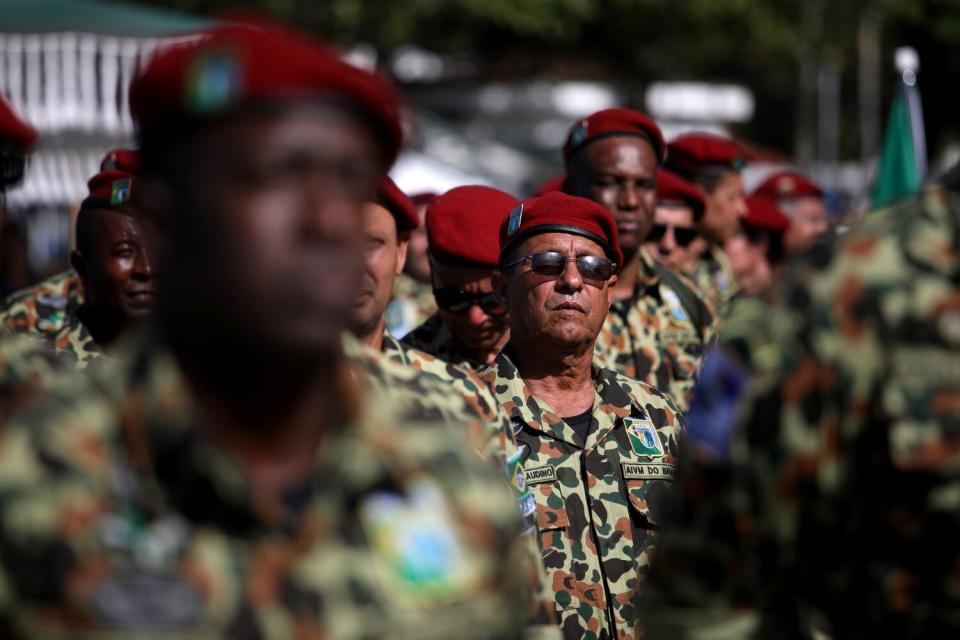
Many here are bracing for turmoil because Bolsonaro has repeatedly suggested that if he loses, he may not accept the results.
Echoing former President Trump, whom he has described as his "idol," Bolsonaro has time and again questioned the integrity of Brazil's voting system, sowing doubts among millions of his supporters about a pillar of Brazil's democracy.
The tough-talking president has said that if needed, he and his supporters "will go to war.”
Polls show that 3 out of 4 of Bolsonaro supporters, after hearing their leader question the trustworthiness of the nation's voting machines, have little or no trust in them.
"The people won’t accept a loss," said Maria da Penha Fernandes, 65-year-old seamstress in Rio de Janeiro. “There will be a revolt."
Polls had predicted that Bolsonaro would draw as little 33% in the first round of voting on Oct. 2. But he ended up with 43% to Lula's 48%, with other candidates splitting the rest.
That has fueled his supporters' doubts about current polls, which show Lula likely to win Sunday's runoff election. Insisting polling operations are part of a broader conspiracy to rig the vote, Bolsonaro's allies in Congress recently introduced legislation that would make it a crime to produce a poll that fails to accurately predict results.
Among Brazil's left, there are growing fears that Bolsonaro is paving the way for a coup or an insurrection modeled on the storming of the U.S. Capitol by Trump supporters last year.
A former army officer who has praised Brazil's two-decade military dictatorship that ended in 1985, Bolsonaro has expanded the power of the armed forces during his four years in office, with an estimated 6,000 soldiers now serving in his administration.
Private weapon ownership has proliferated since Bolsonaro delivered on a key campaign promise to loosen gun control laws.
Since 2018, the number of weapons registered by civilians has tripled to nearly 2 million, according to Instituto Sou da Paz, a nongovernmental organization.
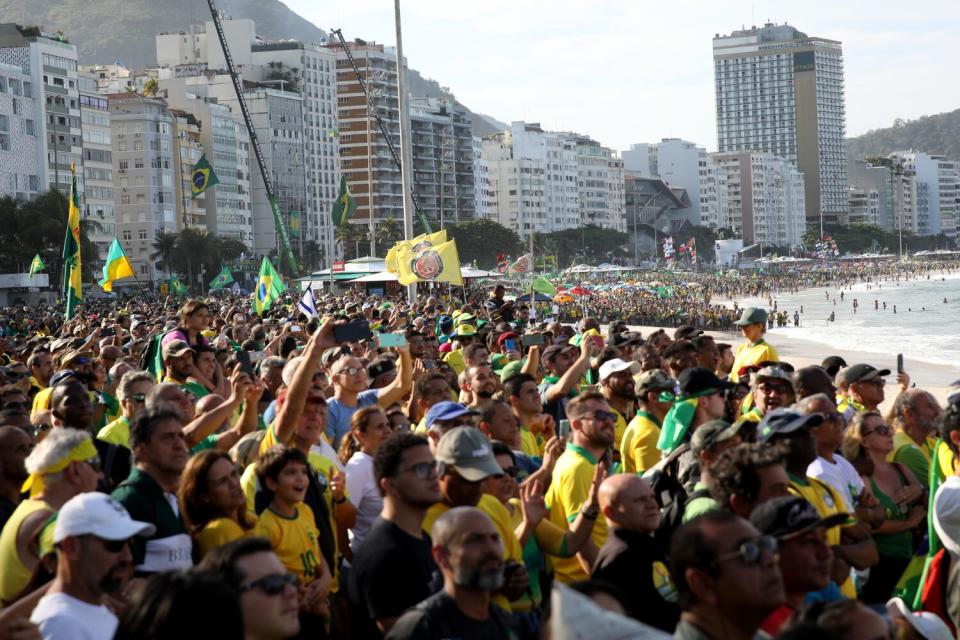
Lula supporters fear that Bolsonaro and his backers are readying for a fight.
“The idea is to arm the people for confrontation," said Tereza Cristina de Oliveira, a 67-year-old government worker who plans to vote for Lula. "Our democracy is under attack.”
Last Sunday, a violent event intensified such fears, when a former Brazilian congressman and Bolsonaro ally under investigation for spreading fake news fired shots and threw grenades at police as they tried to arrest him. Two police officers were injured.
Writing on Twitter, Lula tied the incident directly to Bolsonaro's rhetoric.
"They have created a violent faction in society, a machine to destroy democratic values," Lula said.
Last month, nearly a million Brazilians, including top business leaders, actors and pop stars, signed a letter calling on Bolsonaro to uphold the basic tenets of democracy.
"There is no room for authoritarian backsliding in today’s Brazil," the letter read. "Dictatorship and torture belong to the past."
But other prominent Brazilians, including many of the country's top soccer players, such as Neymar da Silva Santos Júnior, have come out in favor of Bolsonaro.
The two candidates have very different track records — and wildly different visions for Brazil's future.
Bolsonaro, 67, has pushed for limited government intervention on matters as diverse as the COVID-19 pandemic and the environment, chafing at foreign pressure to reduce destruction of the Amazon rainforest. He has made disparaging remarks about women, Black people and the LGBTQ community and supports harsh policing policies, saying criminals deserve to “die in the street like cockroaches.”
Lula, 77, is a former union leader who helped resist the dictatorship four decades ago. As president he instituted a program of cash transfers that helped lift 22 million people out of poverty, and as a candidate he has tapped into Brazilians’ longing for more prosperous days.
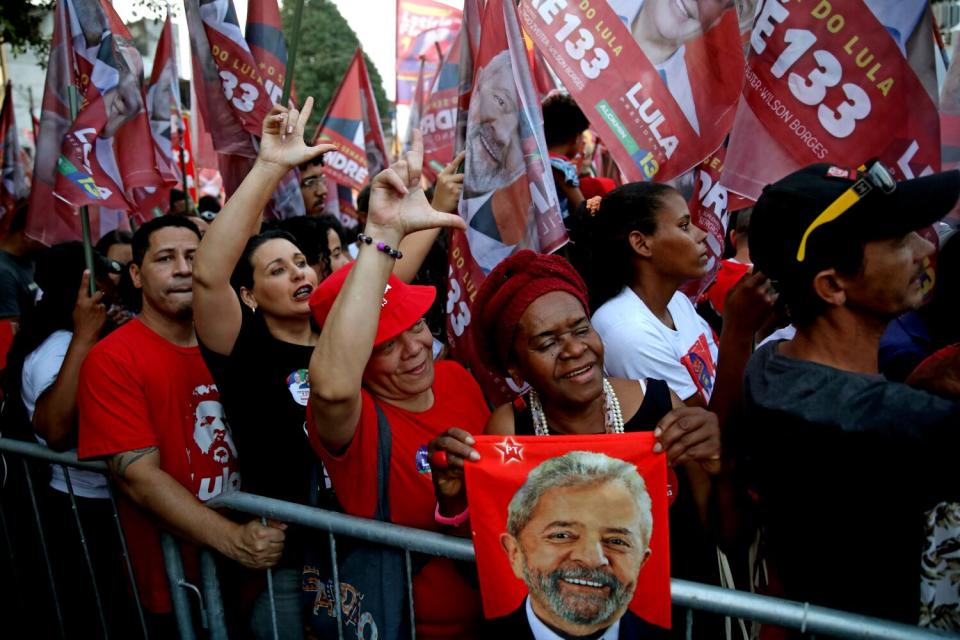
He was jailed in 2018 on corruption charges but was released the next year after a court ruled that the judge who oversaw his trial was biased. Still, many have not forgotten his tainted past.
The differences between the two are so stark that even music has become politicized.
Samba, the syncopated style created by Brazil's African slaves, has become synonymous with Lula supporters. Country music, on the other hand, is linked to Bolsonaro.
The divisions are visible in the streets.
Take a Bolsonaro rally held Wednesday in Rio de Janeiro's Sao Salvador square.
Located in a neighborhood in Rio's south zone that is famous for its leftist leanings, the square is surrounded by apartment buildings with red beach towels printed with Lula’s face hanging from their windows.
During the first round of voting, Lula supporters gathered here to celebrate his victory.
But on a recent evening, Bolsonaro backers decided to hold their own event in the square.
Toting boomboxes plastered with stickers of Bolsonaro’s face, demonstrators trickled in, forming a small crowd. Most were dressed in yellow soccer jerseys that have become a symbol of far-right politics in Brazil.
As they entered, a woman dressed in a shirt covered with Lula stickers rushed to leave.
“I want to get home, I’m scared to be here with this,” she said, patting the stickers.
The Bolsonaro supporters included Idlaile da Mazzo, a 33-year-old homemaker, and her friend, Raquel Pereira, a 35-year-old baker.
Da Mazzo is one of the millions of evangelical Christians who back Bolsonaro.
“It’s a spiritual war. A spiritual fight," said Da Mazzo, who likes that Bolsonaro is antiabortion and opposes what she referred to as "gender ideology" — policies designed to be inclusive for people who are transgender.
“He defends our values," she said.
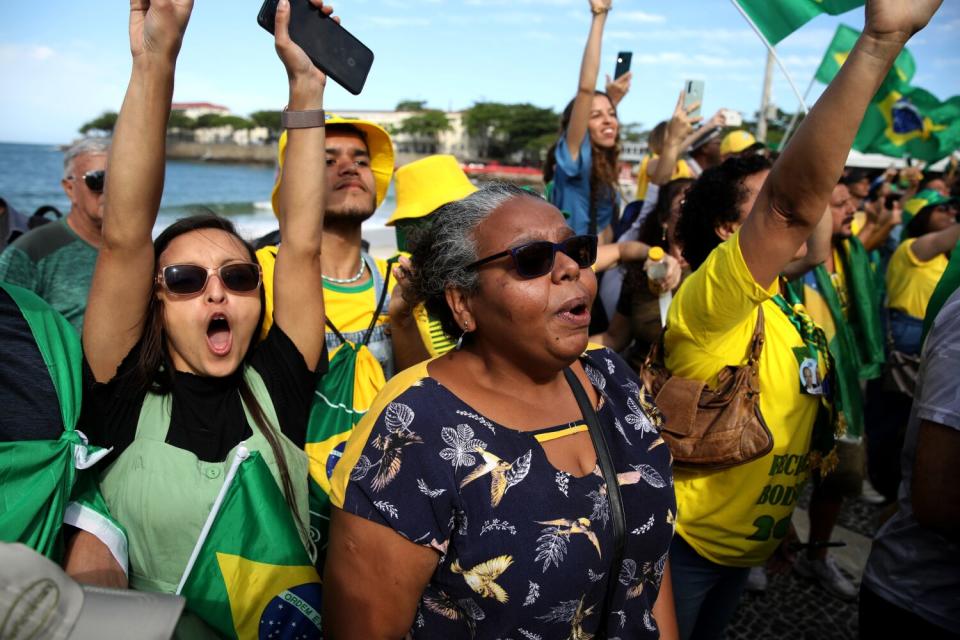
Pereira said she doesn’t believe Brazilian election officials or foreign governments including the United States that insist Brazil's voting system is sound.
“Why should I trust them?" she said. "Prove to me there is no fraud. They can’t prove it.”
Pereira fears that rigged voting machines could rob Bolsonaro of victory. If he loses, she plans to go out on the street in protest, she said. “I won’t keep quiet if there’s fraud."
No matter what happens Sunday, Bolsonaro has already had a transformative effect on Brazilian politics, said Marco Antonio Teixeira, a political scientist at the Getulio Vargas Foundation think tank.
In the first round of voting, the president's conservative allies made significant inroads in Congress.
Ricardo Salles, Bolsonaro’s former environment minister who resigned last year after being accused of participating in an illegal logging scheme, won outright with one of the highest vote totals of any legislative candidate in the country.
Eduardo Pazuello, the health minister who oversaw Brazil’s catastrophic handling of COVID-19 at the height of the pandemic, also won.
The challenge beginning Monday, Teixeira said, will be bringing Brazilians together after an election that has torn them apart.
“You have half of Brazilian society that is happy to be governed by Bolsonaro and the other half that can’t stand it," he said. "So we have a huge challenge here, regardless of the result.”
Special correspondent Ionova reported from Rio de Janeiro, Times staff writer Linthicum from Mexico City.
This story originally appeared in Los Angeles Times.

